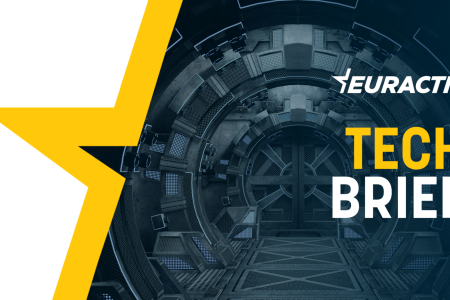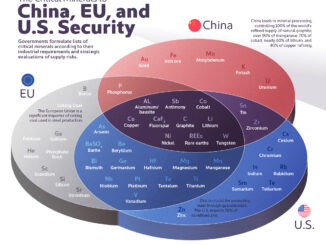
Welcome to Euractiv’s Tech Brief, your weekly update on all things digital in the EU. You can subscribe to the newsletter here.
“We have the infrastructure covered. We also need to invest in training.”
– said Portuguese member of the European People’s Party (EPP) Maria da Graça Carvalho, and rapporteur on the amendments to the European High-Performance Computing Joint Undertaking, on Wednesday.
Story of the week: On Wednesday, the European Parliament’s Committee on Industry, Research, and Energy voted to improve small business access to AI supercomputers and raise environmental standards for such infrastructure. These amendments to the European High-Performance Computing Joint Undertaking are scheduled for a vote at the Strasbourg plenary on 24 April. Read more.
Don’t miss: The European Court of Justice (ECJ) ruled on Thursday that a 2019 EU regulation obliging EU citizens to give their fingerprints for national identification cards was based on the wrong legal basis, declaring the EU law entirely invalid. The court in Luxembourg also ruled that the obligation to include two fingerprints, despite affecting fundamental rights, is justified. Even though the legislation was overturned, the ECJ judge ruled that the EU regulation from 2019 remains effective until a new regulation enters into force, expected at the latest in December 2026. Otherwise, it will expire. EU regulators stipulated that national ID cards use fingerprints to increase the security of the identification documents. Read more.
Also this week:
Council strengthens call to make social media influencers accountable for their actions
Child sexual abuse: New approach puts focus on Coordinating Authority’s roles
AI Act’s global effects might be overstated, experts say
EU’s telecom regulatory body needs to change, says European Commission director Kamila Kloc
Bundestag adopts its DSA implementation law with one-month delay
Before we start: If you just can’t get enough tech analysis, tune in on our weekly podcast.
Today’s edition is powered by Google
Google supports European election fact-checking
Google is contributing €1.5 million to help launch Elections24Check, a coalition of news and fact checking organisations working together to fact check the European Parliamentary Elections.
Learn more about our work in this election year.
Artificial Intelligence
Council of Europe AI treaty. A draft treaty aimed at safeguarding human rights, democracy, and the rule of law, agreed upon at the Council of Europe last Thursday, grants countries the authority to determine the involvement of the private sector in artificial intelligence (AI) development. Exemptions for the private and defence sectors have been a major point of contention during negotiations for what is touted as the world’s first international treaty to protect human rights in AI development. In the latest version of the convention, countries are tasked with ensuring that the private sector adheres to the treaty, said sources familiar with the issue. Read more.
Overstated effects? The policymakers behind the EU’s AI Act, which was passed by the European Parliament with a large majority on 13 March, aimed to set a new global standard for regulating the technology. But not everyone agrees the impact will be as wide-ranging as promised. While experts who Euractiv spoke to were in no doubt the legislation will have a worldwide effect, just how big it will be, and whether the complex package of laws will keep investments in the bloc are up for debate. Read more.
Biotech to the forefront: The Commission announced a new strategy to future-proof its leadership in biotech on Wednesday. Their plan is to stimulate more research and development, including helping companies make better use of AI, as well as boost market demand, shorten the time it takes to place innovations on the market, and channel more investments into biotech. In the same week, Nvidia unveiled a suite of services allowing healthcare companies to use generative AI for drug discovery. Read more.
Guidelines for generative AI. The EU Commission released a set of guidelines on Wednesday for the responsible use of generative AI, in research, calling for transparency, privacy, and respect for intellectual property rights.
Apple-Google AI partnership on the horizon? Apple is reportedly in discussions to integrate Google’s Gemini AI engine into the iPhone, according to a Bloomberg article published on Monday. The talks involve licensing Gemini, Google’s set of generative AI models, to power new features in iPhone software. Apple has also explored discussions with OpenAI for the potential use of its model and with other AI companies as it seeks to leverage the capabilities of large language models, that are able of analysing extensive data and producing text autonomously, The New York Times reported on Tuesday.
New Microsoft AI CEO. Mustafa Suleyman, co-founder of Google’s DeepMind announced on Tuesday in a post on X, that he is joining Microsoft as CEO of Microsoft AI. “I’ll be leading all consumer AI products and research, including Copilot, Bing and Edge. My friend and longtime collaborator Karén Simonyan will be Chief Scientist, and several of our amazing teammates have chosen to join us,” he wrote in the post, adding that under a new CEO, Inflection still aims to expand its reach by making its API accessible to developers and businesses globally.
Competition
Meanwhile in the US. The Justice Department and 16 state attorney generals have filed an antitrust lawsuit against Apple, alleging that the company violated laws by restricting competition from other companies offering applications that compete with Apple products, such as digital wallets. The lawsuit claims that Apple’s policies harm consumers and smaller companies. Last week the European Commission, fined Apple €1.8 billion for abusing its dominance in the music streaming market. Third-party payments and contactless payments are also issues of concern, with the Commission sharing commitments by Apple in January, to allow third-party payments.
Not within your power. Advocate General of the European Court Nicholas Emiliou said on Thursday that EU antitrust regulators went beyond their authority in blocking American biotechnology company Illumina’s $7.1 billion bid for Grail, another US biotech company. In 2021, the European Commission evaluated the Illumina-Grail deal, even though its revenue fell below the EU merger threshold. Following the Commission’s decision to block the deal, Illumina contested it, initiating a legal dispute. In 2022, a subordinate tribunal ruled in favour of the EU competition authority, prompting Illumina to escalate the matter to the Court of Justice of the European Union. The current news is about an opinion of the Advocate General, which means that it is not legally binding and the Court can still reach a different conclusion.
Cybersecurity
Cyber Solidarity Act heads to Plenary. On Wednesday the Parliament’s Committee on Industry, Research and Energy (ITRE) voted to pass the Cyber Solidarity Act’s provisional agreement resulting from inter-institutional negotiations which ended on 5 March. According to Lina Gálvez Muñoz who spearheaded the file, the main points of discussion included the need to harmonise the different entities and structures with other cybersecurity legislation. Gálvez Muñoz emphasised that the Parliament’s highest priorities include capacity-building and skill development to ensure cybersecurity and workforce competencies. During the negotiations, the Parliament also ensured an increased role for ENISA, the EU cybersecurity agency. A major point of contention during the negotiations was the budget, with funds reshuffled, Gálvez Muñoz emphasised that there would still be enough financial resources for the act.
Microsoft loses major customers. Due to recent cyber attacks in which two hacker groups gained access to Microsoft systems, US authorities now appear to be looking for alternatives by increasingly moving their data to other cloud providers, Golem reported on Monday.
French MPs prepare report on NIS 2 transposition. While the French government is preparing its bill transposing the EU directives on cybersecurity (NIS 2), digital resilience (DORA) and critical entities (CER), French MPs started to work on a report on Monday on how NIS 2 will be transposed into French law, auditioning the President of the cybersecurity agency ANSSI, Vincent Strubel.
Data & Privacy
Germany’s digital committee advises on the implementation of the Data Act. The Federal Digital Ministry and the Ministry for Economic Affairs and Climate are co-leading the implementation of the Data Act. During the digital committee session held on Wednesday, both ministries consulted together with federal parliamentary parties on defining the authority structure for the national supervisory authority and establishing criteria, tasks, functions and selection procedures for the data coordinator.
Digital Markets Act
The DMA compliance battle. The Commission has been organising a number of technical compliance workshops with interested stakeholders this week. The six gatekeepers that had to answer to stakeholders during the meetings this week were Apple, Meta, Amazon, Alphabet and ByteDance. Microsoft’s hearing is scheduled for next Tuesday.
Digital Services Act
Bundestag adopts its DSA implementation law with one-month delay. The Bundestag, adopted on Thursday a law implementing the Digital Services Act (DSA), an EU legislation regulating how online platforms should handle illegal and harmful content. Germany’s legal framework for the DSA was adopted by a majority of the social democrat SPD, the Greens, and liberal FDP – the members of the ruling coalition – with the opposition Christian Democrats (CDU) and far-right Alternative for Germany (AfD) voting against and the leftist die Linke group abstaining. Read more.
New DSA guidelines on the way. The European Commission is expected to adopt new guidelines, likely next week, under the DSA, which will require major online platforms like X, TikTok, and Facebook to take action to reduce risks to elections or face fines. These guidelines aim to address concerns over election interference and misleading AI-generated content, particularly in the lead-up to the European Parliament elections in June. While the guidelines are not legally binding, platforms failing to address risks could be fined under the DSA, with penalties of up to 6% of their annual global turnover.
Hurry up, member states. The European Commission disclosed that eight EU member states, including Poland and Lithuania, have not yet appointed a national regulator to enforce DSA, Euronews reported on Wednesday. These countries, which are home to online platforms such as Allegro and Vinted, are still lacking regulators despite the DSA’s requirement for their designation by 17 February.
“Astonished by the European Commission dynamism”, Roch-Olivier Maistre, the President of Arcom, the French audiovisual regulatory authority, said at a French Senate hearing, when talking about the Digital Services Act implementation. He explained that member states have been waiting on the Commission to make the DSA work, hence the dynamism of Commission services. According to Maistre, the national authorities that will lead within the European body of regulators include Ireland -because most of the very large platforms are situated in Dublin, Germany, the Netherlands and Luxembourg.
Industrial strategy
Final green light to raw materials. The Council of the EU approved the Critical Raw Materials Act to reduce reliance on other countries, particularly China, for essential resources like lithium and rare earth elements, and to secure a sustainable supply of raw materials critical for the green transition, digital industries, and defence sectors. By 2030, the Act aims for the EU’s annual consumption of these materials to be 10% locally extracted, 40% processed within the block, and 25% from recycled materials. No single third country can supply more than 65% of Europe’s annual consumption. The Act also sets deadlines for project assessments within the EU: 27 months for extraction projects and 15 months for recycling/processing projects. Read more.
EU and Norway partner on raw materials. The EU Commission signed a memorandum of understanding to partner with Norway to “develop sustainable land-based raw materials and battery value chains.” As a next step, a business matchmaking event is planned for April 22 at an industry conference in Hanover. The partnership specifies that it is only for land-based materials. Previously the EU has expressed it will not buy raw materials that Norway is looking to extract from the deep sea.
New Nvidia chip. Nvidia has revealed its newest AI chip, claiming it can perform certain tasks 30 times faster than its previous version, BBC reported on Monday. Alongside the B200 “Blackwell” chip, CEO Jensen Huang introduced a suite of new software tools at the company’s annual developer conference.
$8.5 billion for Intel. On Wednesday, the US Department of Commerce and Intel announced a memorandum of terms, according to which the chipmaker will receive almost $8.5 billion in government funding under the Chips and Science Act.
First quantum computer available on OVHcloud. Leading French cloud service provider OVHcloud formally installed its first quantum computer. The computer works with photons and was designed by French startup Quandela.
Europe’s patent progress. Europe’s patent applications remained largely unchanged in 2023 compared to the year prior, the European Patent Office said on Tuesday. The office received close to 200,000 applications, roughly the same as last year, despite a continuous push to improve innovation in the bloc. Only 43% of those were from countries based on the EU, an increase of 1.8% from last year.
Law enforcement
New CSAM approach. The Belgian Presidency of the EU Council is proposing a new approach to a draft law targeting online child sexual abuse material (CSAM). The focus is on coordinating authorities in EU countries, emphasising risk categorisation and detection orders. The approach aims to improve risk assessment and introduce categorisation. The new approach was discussed during a Law Enforcement Working Party meeting on Tuesday. In the document, delegations are asked to provide technical concerns about detection technologies, enabling the inclusion of extra safeguards. Additionally, defining the EU Centre’s role in technology verification and collaboration with other EU cybersecurity agencies is also needed. Read more.
Russia cut off from major cloud service providers. As part of the 13th sanction package dating back to December, Microsoft, Amazon, and Google are likely to switch off the connection to cloud services in Russia, Golem reported on Monday. Further sanctions against Russia, were announced by Microsoft even before the Russian presidential election phase. Since Wednesday, access to various cloud services was planned to be blocked.
Media
Quarter billion Euro fine for Google. The French antitrust authority, l’Autorité de la Concurrence, fined Google and Google’s parent company Alphabet €250 million on Wednesday for failure to enact its commitments on related rights enshrined in EU’s copyright directive. This is the authority’s fourth decision since the transposition of the directive in French legislation. It had previously fined Google with €500 million in 2021. The Autorité said on Wednesday that the new fine was given, because Google disregarded most of its commitments to fairly compensate press publishers for content appearing on its search engine, failed to negotiate in good faith with news publishers, and because Google used press agencies’ content to train its AI platform without their consent or possibility to opt-out.
Platforms
Influencer regulation update. The Belgian Presidency of the Council of the EU is advocating for increased accountability of social media influencers regarding the content they share online, as per a draft document dated 13 March seen by Euractiv. The Council is in the process of formalising its stance on the regulation of influencers and online content creators, an issue currently debated in Spain, Italy, and across the EU. The draft document suggests that the Council will adopt a firmer position on the responsibilities of influencers compared to previous expectations. Read more.
Meta’s offers to reduce non-advertisement fees to quell criticism. Meta announced plans to reduce its monthly subscription fee for Facebook and Instagram, which promises ad-free experiences, from €9.99 to €5.99 for web users. This decision comes in response to criticism from privacy and antitrust regulators, who argue that the subscription service requires users to pay for privacy protection, Reuters reported on Tuesday. “In reality, it is not about the amount of money – it is about the ‘pay or okay’ approach as a whole. The entire purpose of ‘pay or okay’, is to get users to click on okay, even if this is not their free and genuine choice. We do not think the mere change of the amount makes this approach legal,” said the founder of NOYB and activist Max Schrems.
Next mandate platforms regulation: “focus on use,” says MEP van Sparrentak. At an event hosted by Mozilla on Wednesday, Green Dutch Member European Parliament, Kim van Sparrentak, who was the rapporteur of the report on addictive design, said the next mandate should focus on implementing numerous digital regulations that were passed on one side, but also focus on regulating how technologies are used. She listed three topics that should be looked at: the use of algorithms and artificial intelligence in the workspace, addictive designs, as well as online influencer marketing.
X’s updated API. On Tuesday, X introduced a new feature for its application programming interface (API), called Top Up. This feature addresses feedback from the developer community. It allows developers to purchase a cap increase to retrieve more posts through the API.
UK TikTok ban next? Pressure is mounting on the UK government to adopt a stricter stance towards TikTok, mirroring actions taken by the US against the Chinese-owned app. Following the passage of a bill in the US last week that could lead to a ban on TikTok if its owner, ByteDance, does not divest its stake in the app, former Conservative leader Iain Duncan Smith voiced support for similar actions in the UK, Politico reported on Monday.
Psychologist quits Meta. Psychologist Lotte Rubæk, advising Meta on suicide prevention and self-harm, has resigned, alleging the company ignores harmful content on Instagram, disregards expert advice, and prioritises profit over user safety, The Guardian reported on Saturday.
Telecom
A change is needed. The role of the Body of European Regulators for Electronic Communications (BEREC) needs to change, given the expanding regulatory scope of its members in broader ecosystems, Kamila Kloc, the European Commission’s director in charge of the digital decade and connectivity, told Euractiv in an interview. The EU telecom sector is currently caught between rigorous European legislation and the need to invest in infrastructure, argue incumbent operators. Yet consumer organisations and competitors warn against deregulation, which would pose a risk to small businesses and lead to higher prices for consumers. Read more.
“Build scale,” says worldwide organisation of mobile industry. On Wednesday, at an event co-organised by GSMA and Euractiv, the mobile industry organisation GSMA published its manifesto for the EU’s future telecom infrastructure. It suggests an adjustment of the EU merger regulation, a review of the EU spectrum policy, a regulatory level playing field with IoT and cloud markets and condemning the fragmentation of the telecom single market, notably due to a fragmented implementation of the European Electronic Communications Code.
800 European fibre operators sceptical about “European Champions”. On Wednesday, the European Local Fibre Alliance (ELFA), the organisation of alternative public and private local fibre operators, said it was sceptical about certain Commission scenarios within its connectivity white paper, especially regarding the call for European Champions. ELFA believes that this “would potentially discriminate against the large number of small and medium operators that currently represent over 50% of fibre to the home availability”. Additionally, ELFA wishes that the completion of the copper switch-off, set by 2030 by the Commission happens “exclusively on terms which are fair and avoid distortions of competition by former state enterprises.”



